ESA-sponsored medical research doctor for Concordia, Evangelos Kaimakamis, or ‘Vangelis’ for short, continues his chronicles:
The Concordia summer crew has left the base and only the 15 to stay all winter remain in the base now! About three weeks ago we saluted the last plane that took off from our ‘skiway’ leaving us alone in the middle of nowhere for the next nine months. It was like an old movie scene: the DC-3 Dakota airplane firing up its engines and moving away in the smoke, the snow lifted by its propellers. We waved goodbye with mixed emotions thinking about the long winter ahead. It was something like the closing scene from the movie Casablanca!
Before this goodbye, the last Raid Traverse came with 120 tonnes of food, fuel and equipment and it kept us busy for five days. We had to unload the Raid, organise supplies for the winter and place them in appropriate containers and refrigerators for the next ten months.
Talking to the Traverse staff, who had travelled 1100 km on the ice to reach us from the coastline, offered a different perspective and a nice subject for discussion until their departure a few days later.
On their day of departure the smoke from their engines rose into the sky covering the abundant Antarctic Sun for a while. Watching these impressive tractors moving together and pulling large fuel tanks, containers and living compartments reminded me of humankind’s desperate efforts to conquer nature and harness its forces in the wildest of the lands.
Over the next days, the temperature began to drop, averaging -45oC while the Sun was considerably lower in the horizon. We witnessed our first sunset on February 12. Cameras were ready and the official end of the summer had arrived!
The last plane has now departed and we have all the time in the world to organise our everyday lives and our technical or scientific tasks. All of ESA’s biomedical protocols have started, some technical issues have been resolved. Conducting research related to space medicine in this isolated settlement is fulfilling. I am a test subject for the various experiments, so I have a hands-on approach to the difficulties, constraints and solutions related to this type of research.
The rest of the people in the group are very helpful and morale is high. Apart from the purely scientific work, my duties involve participation in everyday communal chores and of course, during our free time we usually play games and socialise to form a robust group ready to face the difficult winter ahead. A few days ago we took a group photo outside the base with the setting sun under the ice in the background. I raised the Greek flag (perhaps for the first time in Antarctica), that made me proud and has boosted my morale for the rest of my campaign here!
A few days ago we saw the moon rising for the first time as well, a marvellous spectacle, a clearly symbolic event marking the imminent prevalence of night in the polar region. We will have the privilege to enjoy a night sky impossible to see anywhere else in the world! I cannot wait for this view! Our families and beloved ones are thousands of miles away and we are still at the beginning of this adventure. We hope for the best and struggle to be efficient and functional, both as individuals and as a group.
Bon Hivernage!

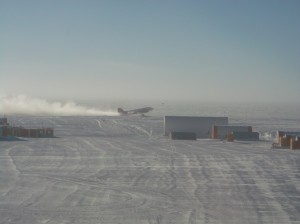
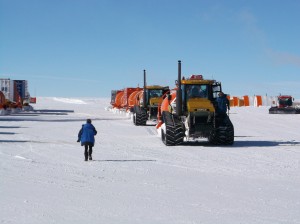
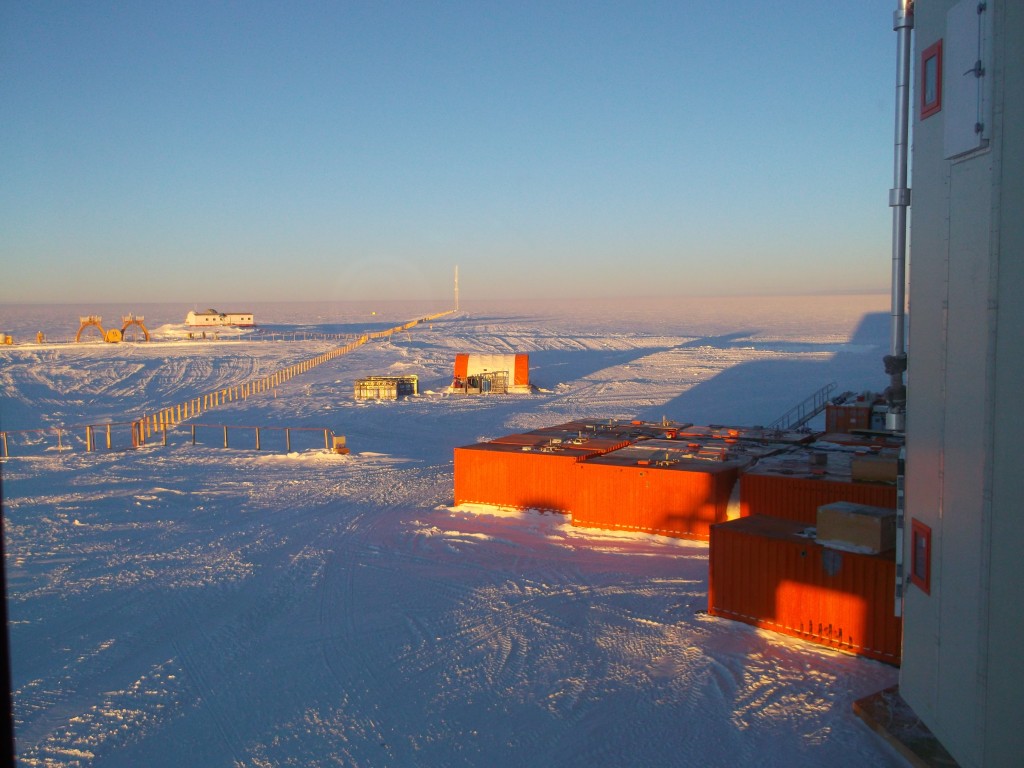
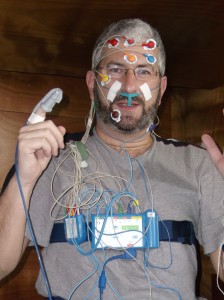
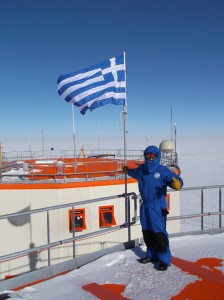


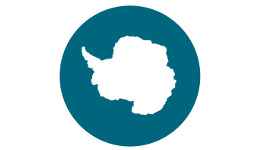
Discussion: 9 comments
Enjoy your stay!!!
Hi! Thanks for the beautiful photos and interesting words – I am enjoying following along from the northern hemisphere.
You remarked that you saw the first moonrise recently? There is a common misconception that the moon is only up at night time, but it actually spends as much time up at night as it does up in daylight (if you think about its orbit, this is the way it has to be). I used the US Naval Observatory’s website (https://aa.usno.navy.mil/data/docs/RS_OneYear.php) to generate rise/set times for the moon this year at Concordia Station, and here is the list, and I also made one for sunrise/set times too:
https://www.astro.indiana.edu/~sjanowie/concordia_moon.html
https://www.astro.indiana.edu/~sjanowie/concordia_sun.html
So in your summer, you won’t see a full moon because it will be below the horizon, but anytime the moon is close to new (i.e. in a crescent phase) you should see it near the sun. However, in your winter, you will not be able to see the crescent phases and only the full (and nearly-full) moon will be above the horizon! I am envious of the view from down there, especially on a dark moon-less night. It must be breathtaking.
Thanks for sharing!!
Hi,
Good luck for the winter! Quick question: why do you need refrigerators, is it to keep things from getting too cold? 😉
Considering he is a Greek scientist, would it not make more sense to provide a translation of the article in Greek rather than a link to a non-existent Italian version?
Hello Evangelis,
I just discovered this blog and I’ve been reading through some of the recent entries and I am both fascinated and excited. I imagine that is how all of you must feel especially when you arrived. 🙂
I am looking forward to reading more from all of you and the research you are conducting aswell as the experiences you are making. I hope that all of you enjoy this unique experience and that your research goes well. 🙂
Speaking of which can you tell me what kind of medical research you are planning to conduct?
I also would very much like to read something about how your sleeping patterns and habits change so maybe you could write something about that in one of your upcoming entries.
In any case I wish you all the best and warm greetings from Germany relayed through Ecuador. 🙂
Stephan
Hello there! My name is Georgia and I have I question for you: I work for a greek newspaper and I want to make a story about the mission. Is there any chance to send some questions to Evangelos?
Thank you and keep up the good work!
Hello, interview requests for press can be sent to hsocom@esa.int . Other questions can be asked via the comments in this blog.
Hello Vaggelis!
I have read an article in BHMA newspaper today and learned about you and your mission!
Many wishes from Greece for a pleasant and productive stay in Antarctica, to you and your fellow colleagues!
Good afternoon Vangelis! You make us Greeks proud and we are following your experience with a great interest and a big respect. Yesterday evening on SKAI channel we watched the documentary Frozen Planet and the base where you stay. It sure is an amazing landscape and an amazing adventure. I enjoy myself very cold temperatures a lot, I’ve experienced the -25 degrees C, but the feeling to not be able to leave for the next 10 months makes me feel, even here on my desk in Athens, claustrophobic! You people have great minds and abilities. Keep going and we are watching, even at a safe distance